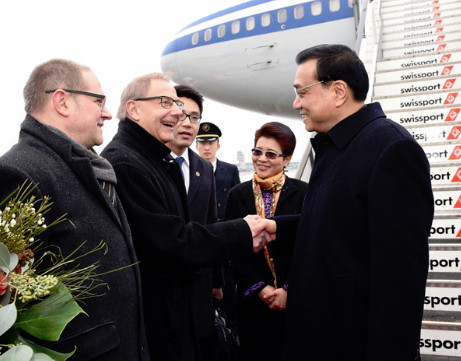

Premier Li Keqiang arrives in Zurich, Switzerland, on Tuesday to attend the World Economic Forum annual meeting in Davos. RAO AIMIN / XINHUA
Closer relations would help offset economic, political uncertainties facing the continent [Special coverage]
Despite increasingly close ties with Europe, Premier Li Keqiang is seeking further opportunities, amid challenges and uncertainties, on his mission to forge even stronger links between China and the fragile European economy.
Li left Beijing for Switzerland on Tuesday to attend the annual meeting of the World Economic Forum, the first overseas trip for a Chinese leader this year.
The premier met founder and president of the forum Klaus Schwab on Tuesday evening, shortly after he arrived at the Alpine town of Davos to attend the forum, which will host 2,500 delegates.
Li will deliver a keynote speech on China's economic situation and its policies concerning comprehensive reform and opening-up.
Delegates in Davos were studying figures released on Tuesday indicating that China's GDP grew by 7.4 percent in 2014, which, although in line with market expectations, was its weakest expansion in 24 years. As the world's second largest economy, estimated by the International Monetary Fund as having contributed 27.8 percent to global GDP growth in 2014, the most in the world, China's economic performance is under close scrutiny.
Li's presence has made headlines as his visit is being seen as indicating that China is looking for even closer relations with Europe, which would help offset economic and political uncertainties on the continent.
In the short term, it may lead to a depreciation of the euro and compound existing obstacles to better trade between China and the European Union.
But as the credit line is relaxed, especially for small and private businesses in the EU, Chinese manufacturers are likely to see orders from EU countries increase.
Numerous areas exist where China and Europe can economically complement each other, said Philip Koch, deputy director of the international department of the Hamburg Chamber of Commerce.
"In areas like urbanization, renewable energies and healthcare, Hamburg companies, as market leaders, can offer innovative concepts and solutions to China on its path toward further modernization.
On the other hand, Europe can benefit from Chinese IT and telecommunication technology, as well as from innovative sectors such as e-mobility," he said.
Peter Ho, a professor of Chinese economy and development at Delft University of Technology, said the EU and China still have much to learn from each other, even if their exchanges have reached historically close levels.
The EU and China share many similarities in history, culture and values, and keeping that in mind when facing temporary political and economic turmoil is key, he said.
"China's unified and centralized system might hide some valuable experiences that would be useful for the EU - such as in its current efforts in preventing a new euro crisis from happening - while the EU's success in sustainable and environmentally-friendly development ensuring a good quality of life for its citizens is equally valuable for China," he said.
Struggling EU casts shadow over Davos
2015-01-20China better at setting global agenda with high-profile presence at Davos
2015-01-20Premier Li to boost economic confidence at Davos
2015-01-20Li‘s presence at Davos forum to bolster intl confidence in Chinese economy: envoy
2015-01-19Davos explores economic solution
2015-01-19Premier‘s WEF speech to send signal of confidence to world
2015-01-20Copyright ©1999-2018
Chinanews.com. All rights reserved.
Reproduction in whole or in part without permission is prohibited.